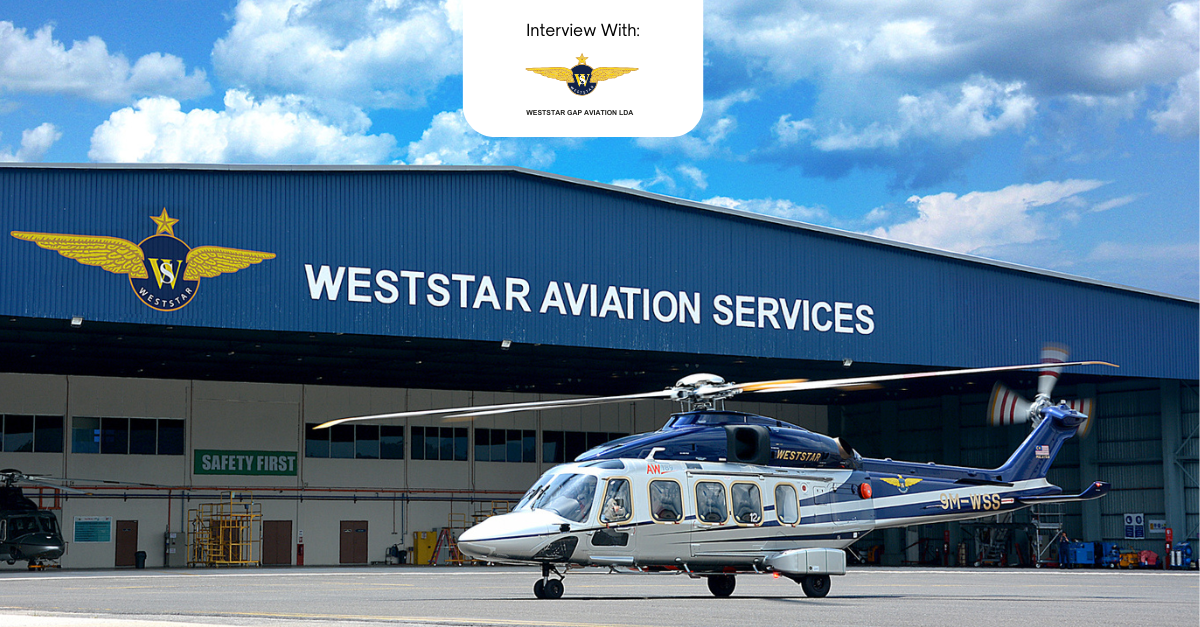During this exclusive interview, The Energy Circle by IN-VR spoke with Weststar Aviation about their pivotal role in supporting the oil and gas industry through safe and reliable helicopter transport, their unwavering commitment to safety and innovation, and their vision for contributing to Timor-Leste's national development and sustainable growth by connecting remote areas and providing essential services like medevac.
Q1. How do you see aviation services supporting the growth and efficiency of the oil and gas industry in the region?
A: Aviation is the backbone of offshore energy logistics. At Weststar Aviation, we
recognize that timely, safe, and reliable helicopter transport is not just a support
function—it is a strategic enabler for the oil and gas industry. Our operations, which
consistently deliver over 1,000 flight hours annually, are tailored to meet the demanding
schedules and safety expectations of clients such as ExxonMobil, Petronas, Harbour
Energy, ENI and Mubadala. By ensuring rapid crew changes, medevac readiness, and
logistical flexibility, we help our partners reduce downtime, enhance productivity, and
maintain operational continuity in remote and high-risk environments.
2. What priorities guide Weststar Aviation in ensuring the highest standards of safety and reliability in its operations?
A: To align with IOGP compliance, Weststar Aviation integrates internationally
recognized aviation safety practices, including IOGP Report 690 Offshore Helicopter
Recommended Practices and Aircraft Management Guidelines (AMG), into its
operational framework. Safety is not a slogan—it is our culture. Guided by our “Goal
Zero – Think Safe. Work Safe. Home Safe” philosophy, we embed safety into every layer
of our operations. Our Safety Quality Assurance (SQA) Master Plan outlines a
comprehensive framework that includes:
• Monthly KPI and SPI monitoring (e.g., HFDM download rates, incident closure rates)
• Integrated programs such as LOSA, MOP, and HFDM
• Humanising Safety—a four-step approach that shifts focus from rule-based blame to
adaptive success, aligning with ICAO SMS and ISO QMS principles
• Just Culture policies that encourage transparent reporting and continuous learning
• This integrated approach ensures that safety is not reactive, but proactive and
predictive.
Q3. How important is aviation in connecting remote areas and supporting national development, particularly in countries like Timor‐Leste?
A: In archipelagic and geographically fragmented regions like Indonesia and Timor-Leste,
aviation is not a luxury—it is a necessity. Helicopter services bridge the gap between
offshore platforms, remote islands, and urban centers, enabling access to healthcare,
emergency response, and economic opportunity. One of the most critical roles aviation
plays is in medical emergency services, where helicopters provide rapid aeromedical
evacuation (medevac) for critically ill or injured patients from remote locations to
advanced care facilities. This capability is vital in regions with limited road infrastructure
and long travel times, often making the difference between life and death. For Timor-
Leste, where infrastructure is still developing, aviation can catalyze national growth by:
• Supporting offshore energy exploration and production
• Enabling rapid deployment of skilled personnel and equipment
• Providing life-saving medical evacuation and emergency response services
• Enhancing regional integration and resilience
We see ourselves not just as a service provider, but as a partner in nation-building.
Q4. What role does innovation and technology play in shaping the future of aviation services for the energy sector?
A: Innovation is central to our operational excellence. Weststar Aviation has
invested in a suite of advanced technologies, including:
• HFDM and HUMS for predictive maintenance and flight safety
• Q-Pulse®️ for integrated quality and safety management
• SKYTRAC and OFP for real-time flight tracking and offshore planning
• SAP Business One for logistics and asset management
These tools not only enhance safety and compliance but also drive efficiency, reduce
costs, and provide actionable insights. As the energy sector evolves, so must our digital
capabilities—toward smarter, greener, and more autonomous operations.
Q5. Looking ahead, what is WestStar Aviation’s long-term vision for its role in supporting Timor-Leste’s emerging energy sector, and how do you see aviation contributing to the country’s sustainable growth?
A: Our long-term vision is to be a strategic aviation partner in Timor-Leste’s energy
transformation. We aim to:
• Establish localized aviation support hubs to reduce dependency on foreign logistics
• Train and empower local aviation professionals, contributing to human capital
development
• Collaborate with regulators and energy stakeholders to embed Humanising Safety
principles into national frameworks
• Providing life-saving medical evacuation and emergency response services
• Support environmentally responsible operations through efficient fleet utilization and
data-driven maintenance
• By aligning our capabilities with Timor-Leste’s development goals, we believe aviation
can be a catalyst for sustainable growth—connecting people, powering industries, and
safeguarding lives.
Stay tuned to The Energy Circle by IN-VR for the latest updates on the global energy industry and exclusive insights from its leading voices.




.png)


